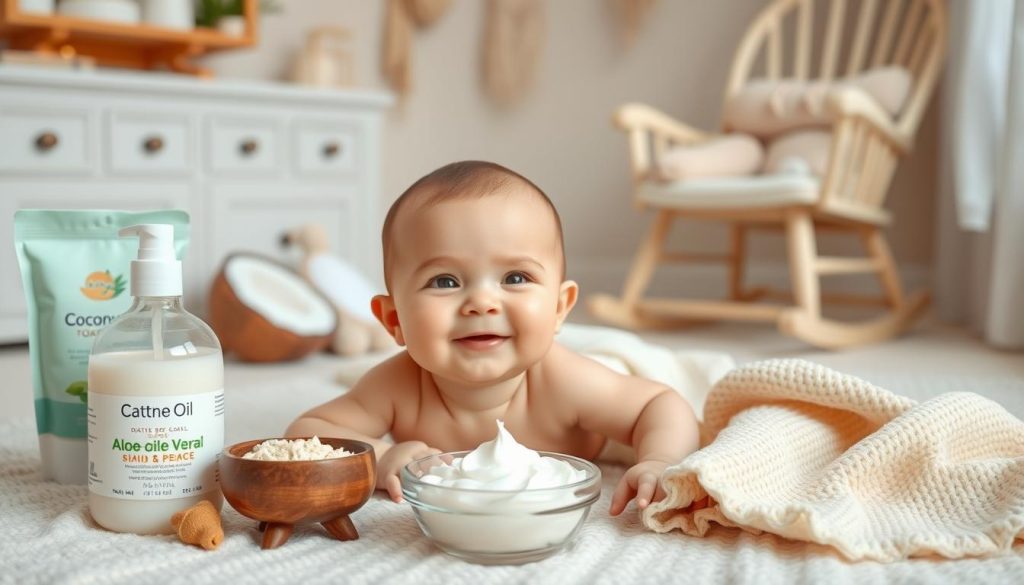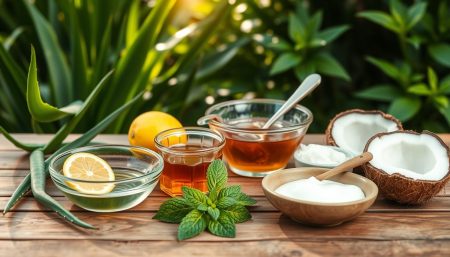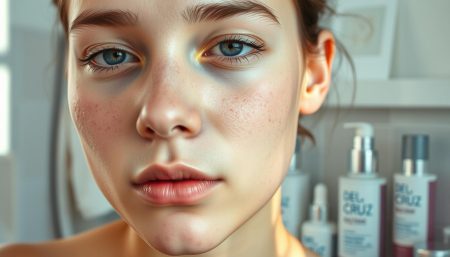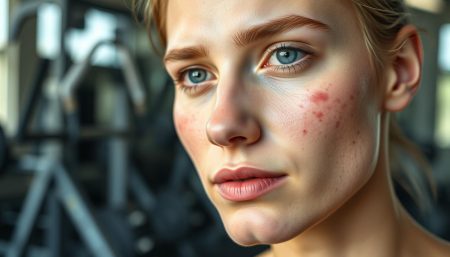Welcome to a reassuring journey through infant skin care. As parents or caregivers, we worry about even the smallest blemish on our newborn’s skin. Baby acne is a common and concerning baby skin problem. But, there are reliable methods and newborn acne treatment options to help soothe your infant’s delicate skin.
This introduction is the first step to understanding how to manage and heal baby acne. We aim to guide you through effective solutions that prioritize your little one’s skin health. Rest assured, there’s a lot of information and resources to fight baby acne. Let’s start this journey together to nurture and protect your baby’s tender skin.
Key Takeaways
- Understanding the common occurrence of baby acne to ease parental concerns
- Exploring proven infant skin care practices to treat and manage baby acne
- Identifying when a pediatric consultation is necessary for baby skin problems
- Analyzing a variety of newborn acne treatment options
- Emphasizing the importance of a gentle approach to infants’ delicate skin
- Learning about preventative measures to maintain healthy baby skin in the long term
Understanding Baby Acne: What It Is and Its Causes
Baby acne is a common skin issue in newborns. It shows up as small, red or purple bumps with pus. These bumps can appear on a baby’s cheeks, nose, forehead, and even chest and back.
This condition is usually harmless and goes away on its own. It’s different from adult acne, which can be caused by hormones, diet, or stress. Baby acne causes are mostly due to leftover hormones from the mother.
Defining Baby Acne and How It Differs From Adult Acne
Baby acne, also known as neonatal acne, affects about 20% of newborns. It happens because of hormonal changes right after birth. These changes reflect the mother’s hormones still in the baby.
Unlike adult acne, which can last or come back, baby acne is short-lived. It usually clears up in a few weeks without needing baby acne remedies.
Common Factors That Lead to Baby Acne
Knowing what causes baby acne can help parents feel better. Hormonal changes that make the baby’s oil glands work more are a big factor. Also, things like saliva or milk on the skin and harsh fabric cleaners can make it worse.
Even though baby acne is natural and can’t be avoided, a gentle cleaning routine can help. This is a good baby acne remedy.
With the right understanding of baby acne and its differences from other skin issues, parents can handle this common phase of their baby’s life better.
Signs and Symptoms of Baby Acne
Spotting baby skin problems like baby acne early can really help. It makes you feel better and helps treat treating baby pimples well. This common issue shows up in different ways on the face.
- Red bumps or pimples: These look like teen or adult acne. You’ll see them on the cheeks, forehead, or chin.
- Whiteheads: Some pimples have a tiny white tip. They’re surrounded by red skin and are very sensitive.
- Rough patches on the skin: Some babies have rough or patchy skin where acne is present.
It’s important to tell baby acne from other skin issues like eczema or milia. Here’s a simple guide to help you tell them apart:
| Condition | Appearance | Common Areas Affected |
|---|---|---|
| Baby Acne | Red bumps or pimples, sometimes with whiteheads | Cheeks, forehead, chin |
| Eczema | Red, itchy patches which may be dry or weeping | Cheeks, elbows, knees |
| Milia | Tiny white bumps without redness | Nose, chin |
Baby acne usually goes away on its own. But watching how it changes is key. It helps in treating baby pimples better.
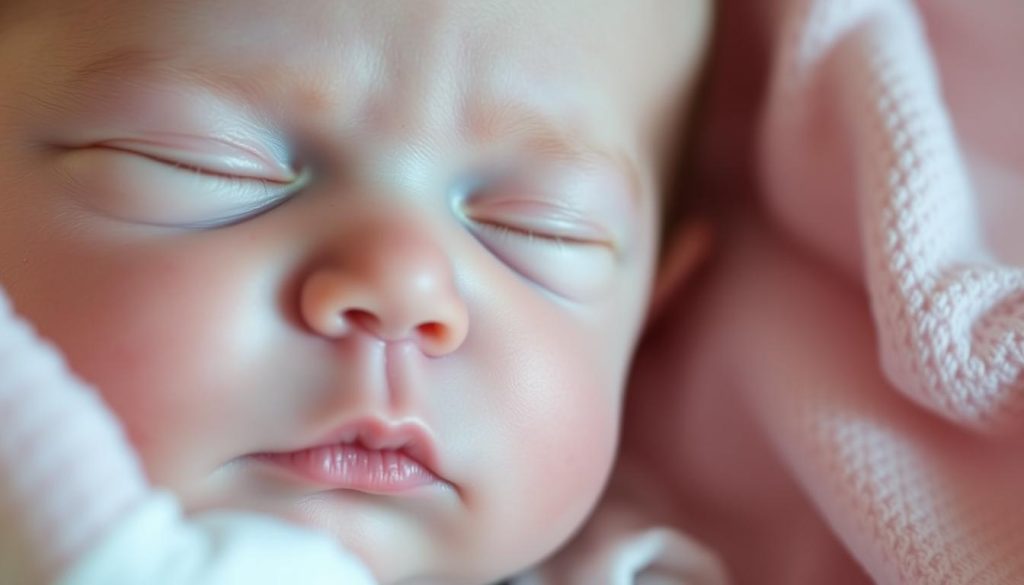
Knowing these signs and taking good care of the skin helps manage baby skin problems well. If the acne doesn’t get better or changes, see a pediatrician.
When to Consult a Pediatrician: Recognizing Severity
Knowing when baby acne needs a doctor’s help is key for good newborn acne treatment and infant skin care. Most baby acne is mild and goes away by itself. But, some signs mean you should call your pediatrician right away.
Alert Signs Warranting Immediate Doctor’s Attention
Call your doctor fast if your baby shows any of these:
- Increasing redness or swelling around acne areas
- Pus or severe rash accompanying the acne
- Acne spreading to other parts of the body like limbs or scalp
- Fevers or signs of discomfort in the infant
These signs might mean an infection or a serious skin problem that needs a doctor’s check.
Evaluating the Severity of Your Baby’s Acne
Deciding if to see a pediatrician involves watching how the acne changes. Here are some tips to help you decide:
| Sign | Normal | Consult Pediatrician |
|---|---|---|
| Duration | Less than 1 month | Continues beyond 1 month |
| Appearance | Few whiteheads or mild redness | Extensive redness, swelling, or pus |
| Behavior Changes | No changes or mild irritation | Crying, fussiness, or discomfort |
Watching how your baby’s acne changes is important. It helps make sure you’re taking the right steps for infant skin care. It also helps decide when to start newborn acne treatment.
Step-by-Step Guide: How to Get Rid of Baby Acne
Dealing with baby acne can be worrisome for parents. But, there are effective baby acne remedies to soothe your baby’s skin. Here’s a detailed guide on how to get rid of baby acne with gentle, safe methods.
- Cleanse Gently: Start by gently cleansing the affected area twice a day. Use warm water and a mild baby soap. Pat the skin dry with a soft towel, avoiding any scrubbing which can irritate the skin.
- Avoid Harsh Chemicals: Use non-toxic, hypoallergenic products for sensitive baby skin. Avoid adult acne products as they contain harsh substances not suitable for infants.
- Keep Skin Dry: Ensure your baby’s skin is dry but not overly dry. Change drool or spit-up soaked bibs and clothes promptly to prevent irritation.
- Natural Oils: Apply a thin layer of coconut oil or breast milk to the affected area. These natural remedies are known for their healing properties and can help reduce acne inflammation.
- Loose Clothing: Dress your baby in loose, soft clothing that allows their skin to breathe. This reduces sweat accumulation which can worsen acne.
- Laundry Care: Wash baby clothes, linens, and blankets in dye-free, fragrance-free detergent. This minimizes potential skin irritants.
Most cases of baby acne will clear up on their own. However, these steps can significantly help in reducing discomfort and enhancing skin healing. Patience and gentle care are key in managing how to get rid of baby acne.
While these tips are useful, always consult your pediatrician before starting any new treatment regimen. This is especially true if the acne persists or worsens. Getting professional advice ensures that your approach to treating baby acne remedies is both safe and effective.
Newborn Acne Treatment: Medical Options and Considerations
Dealing with newborn acne treatment needs careful thought. Parents should weigh the benefits and risks of different treatments. This includes both over-the-counter and medical options.
Topical Treatments and Their Safe Usage
Topical treatments are often used for baby acne. They work directly on the skin and are usually safe. Products with benzoyl peroxide or salicylic acid can help clear acne.
It’s important to use these treatments carefully. Always follow the advice of a healthcare professional. This helps avoid any skin problems.
Potential Prescription Medications and Risks
For serious cases, doctors might suggest prescription drugs. These are for acne that lasts too long and bothers the baby. Treatments could be topical antibiotics or, in rare cases, oral medications.
It’s key to talk about possible side effects with a pediatrician. This includes dry skin or irritation. Also, discuss the long-term plan to make sure the treatment is safe and works well.
| Treatment Type | Common Options | Potential Side Effects | Usage Considerations |
|---|---|---|---|
| Over-the-Counter (OTC) | Benzoyl Peroxide, Salicylic Acid | Skin dryness, redness | Apply small amount, follow pediatric guidance |
| Prescription Medications | Topical Antibiotics | Skin irritation, sensitivity to light | Monitor for adverse reactions, consult before stopping |
Managing newborn acne treatment requires the right diagnosis and treatment. It also needs ongoing care based on how the baby reacts. Always talk to a pediatrician or dermatologist for the best advice.
Infant Skin Care: Do’s and Don’ts
Keeping your baby’s skin healthy is key, especially in the first few months. It’s important to be gentle yet effective to avoid irritating their sensitive skin and preventing baby acne.
Evidence-Based Infant Skin Care Practices
Always pick products without harsh chemicals and fragrances. These are less likely to irritate the skin, which helps in preventing baby acne. Washing your baby gently keeps their skin clean and healthy without drying it out, which is vital in infant skin care.
Common Mistakes to Avoid in Baby Skincare
One big mistake is bathing your baby too much. This can take away important oils and moisture, causing dryness and skin problems. Also, using adult skincare products on babies is too harsh for their sensitive skin.
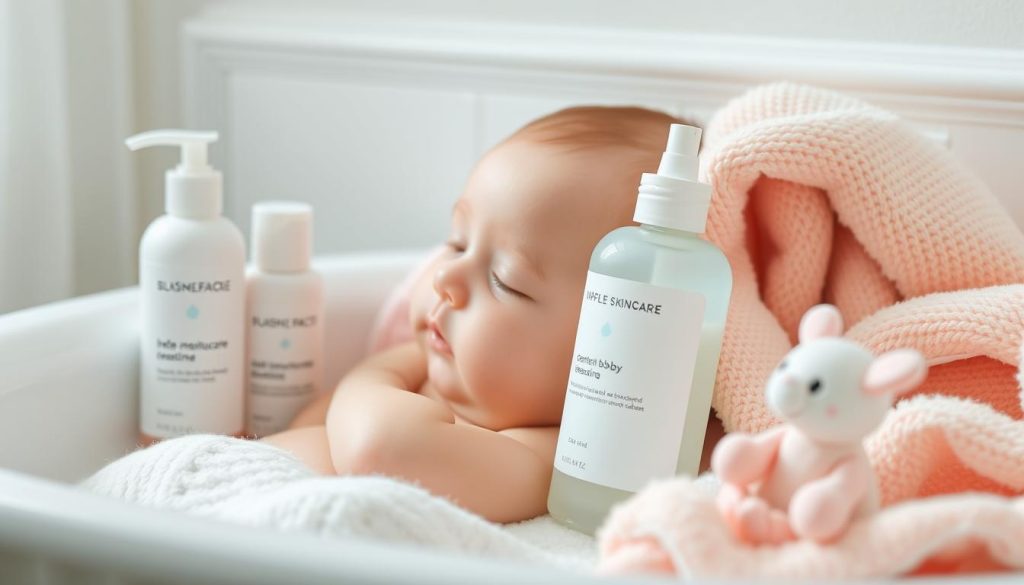
Keeping your baby’s skincare routine simple and mild is key to preventing baby acne. Use a soft washcloth, lukewarm water, and a gentle cleanser. This creates a great routine for healthy infant skin.
| Approach | Benefits | Common Pitfalls |
|---|---|---|
| Use fragrance-free, hypoallergenic products | Reduces risk of skin irritation | Choosing products based on smell rather than ingredients |
| Gentle wiping instead of rubbing | Protects skin barrier | Using rough materials which can damage skin |
| Lukewarm baths | Prevents dryness and maintain skin moisture | Too frequent or hot baths which can strip skin oils |
| Patting skin dry | Prevents irritation and preserves natural oils | Rubbing harshly with a towel |
Following these guidelines will improve your baby’s skin health, helping with infant skin care and preventing baby acne. Remember, a baby’s skin is very delicate and needs careful, gentle care.
Treating Baby Pimples with Natural Baby Acne Remedies
Looking into natural remedies for baby acne can be a good choice for parents. These options are gentle and safe. This section talks about the benefits and things to watch out for with different natural remedies.
Using breast milk is a popular and easy remedy. It’s full of antibodies that help the skin. A little bit applied to the affected areas can soothe and heal.
Exposing your baby to sunlight can also help. A short time in the morning sun can boost vitamin D for skin health. But, be careful not to let them get too much sun, especially during the hottest part of the day.
Choosing the right natural oils is important too. Oils like coconut oil are good because they’re gentle and have antimicrobial properties. Always test a small area first to make sure there’s no bad reaction.
| Natural Remedy | Benefits | Precautions |
|---|---|---|
| Breast Milk | Antimicrobial and soothing properties | Ensure cleanliness during application |
| Sunlight Exposure | Boosts vitamin D, aids in healing | Limited exposure, avoid peak sunlight hours |
| Natural Oils (e.g., coconut) | Hydrate and protect skin, antimicrobial effects | Patch test to check for allergies or reactions |
These natural remedies are a safe way to treat baby pimples. But, always watch for any bad reactions and talk to a doctor if needed. Using these gentle methods can help keep your baby’s skin healthy.
Importance of a Gentle Cleansing Routine
Creating a gentle cleansing routine is key in soothing baby acne and treating baby pimples. This part explains why picking the right cleansers and using the right technique is vital. It shows how important it is to care for a baby’s sensitive skin with special products.
Selecting Appropriate Cleansers for Babies
- Choose products made for infants, without fragrances, parabens, or harsh chemicals.
- Go for hypoallergenic and non-toxic options to keep baby’s skin safe.
- Cream-based cleansers are often gentler than gel or foam for treating baby acne.
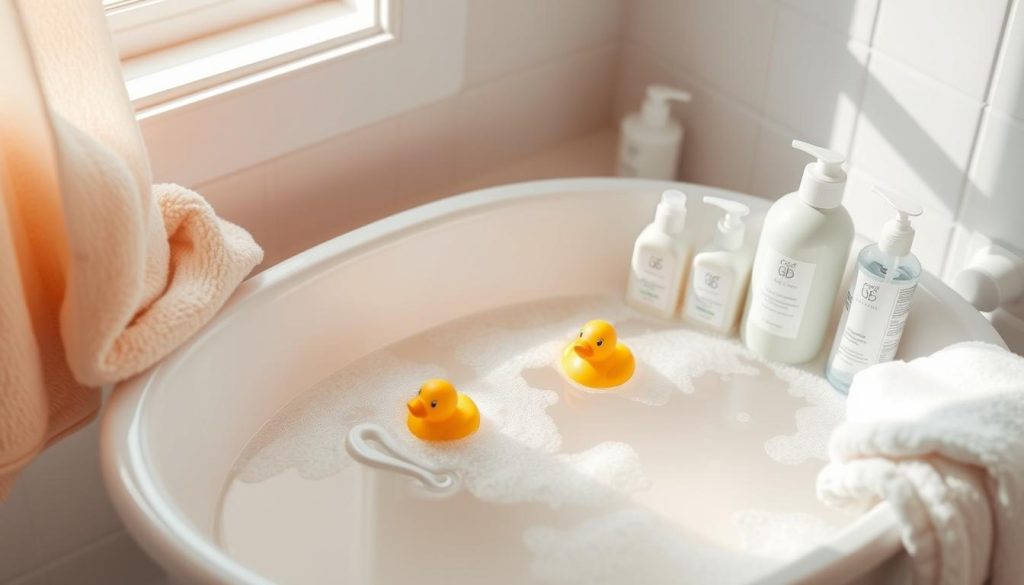
The Correct Technique for Washing Baby Faces
To make the cleansing routine better for soothing baby acne, using the right washing method is crucial:
- Make sure to wash your hands before touching your baby’s face to avoid passing on irritants.
- Use lukewarm water and a soft cloth or cotton ball, moving in circular motions.
- Pat the face dry with a soft towel, not rubbing, to avoid irritation.
By following these steps, you ensure your baby’s face is clean and cared for when dealing with treating baby pimples.
Dietary Factors and Baby Skin Problems
What a breastfeeding mother eats can affect baby skin problems, like preventing baby acne. Diet is key to a baby’s skin health. Some foods can be allergens or irritants.
It’s important to know which foods might cause skin issues. Making changes can help avoid baby acne.
“A baby’s skin is incredibly sensitive to changes in diet, and what a mother eats can transfer through breast milk and influence the occurrence of baby skin problems,” noted a pediatric dermatology expert.
- Identifying food allergens in the mother’s diet that may affect the baby
- Choosing hypoallergenic formulas when breastfeeding isn’t an option
- Observing the baby’s reaction to new foods during weaning periods
Parents should watch how diet changes affect their baby’s skin. This helps prevent baby acne and manage other skin issues.
The table below shows common irritants in a breastfeeding mother’s diet that could cause skin problems in babies:
| Common Irritants | Possible Skin Reaction |
|---|---|
| Dairy Products | Rashes, Baby Acne |
| Caffeine | Redness, Irritation |
| Highly Acidic Foods | Eczema Flare-ups |
Removing these items or reducing intake may help manage and prevent baby skin problems. This is a proactive way to keep a baby’s skin clear and healthy. Keeping a dietary journal can help parents and healthcare providers find specific triggers. They can then create effective dietary plans for skin health.
How Lifestyle Influences Baby Skin Health
Lifestyle choices greatly affect a baby’s skin health. They can change everything from skin texture to how sensitive it is. Knowing how the environment and daily habits impact your baby is crucial. It helps in stopping baby acne and figuring out why it happens.
The Role of Environment and Clothing
Too dry or humid air can cause baby acne. Also, the clothes and detergents used can make baby skin itch. Choose soft, safe fabrics and gentle cleaners to avoid skin problems.
Stress Levels in Babies and Skin Reactions
Babies don’t stress like adults do, but a chaotic routine can still upset them. This can raise cortisol levels, making skin issues like acne worse. Keeping things calm and steady helps keep your baby’s skin in good shape.
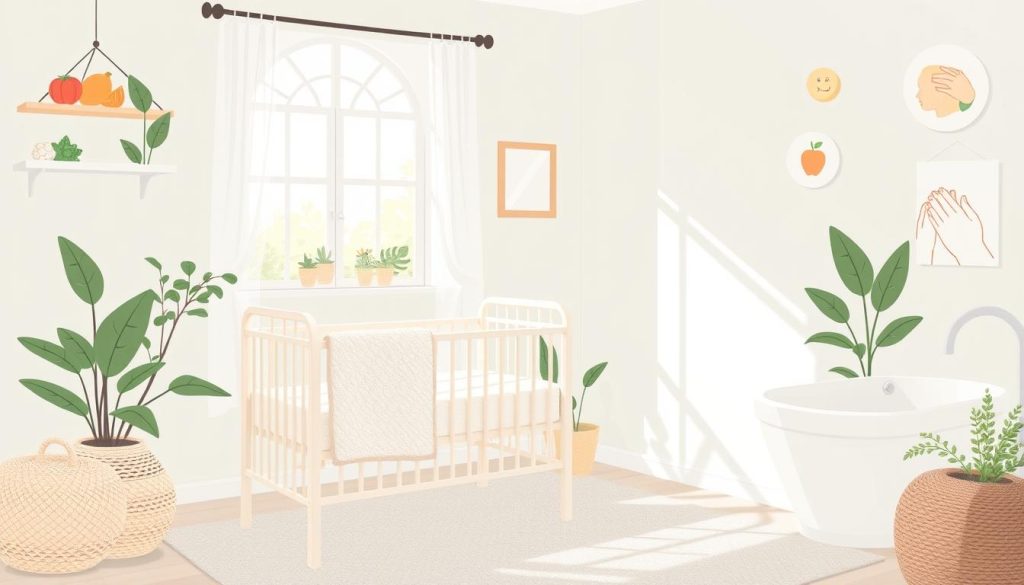
Looking closely at your baby’s surroundings, clothes, and stress levels is important. It helps create a caring space. This space supports your baby’s health and helps prevent acne.
Preventing Baby Acne: Tips and Tricks
To keep your newborn’s skin healthy, follow some key steps. These steps help in preventing baby acne and keeping their skin in top shape. Here are some easy ways to start caring for your baby’s skin from the beginning.
Proactive Skincare Routines for Newborns
It’s vital to keep your baby’s skin clean and moisturized. Use gentle, hypoallergenic cleansers made for babies. Bathe them carefully to avoid drying out their skin. Also, use moisturizers without fragrances or harsh chemicals, made for sensitive baby skin.
- Wash baby’s face daily with mild baby soap
- Pat the skin dry gently; do not rub
- Apply fragrance-free moisturizer
Adjusting Baby’s Environment for Optimal Skin Health
Changing your baby’s environment can also help. Keep their space cool and comfortable to prevent sweating. Use soft, natural fabrics for their clothes and bedding to avoid irritation.
While baby acne often goes away on its own, starting these infant skin care habits early can help. If you’re worried about your baby’s skin or if acne doesn’t go away, talk to a pediatrician.
| Care Aspect | Description | Products Recommended |
|---|---|---|
| Cleansing | Use mild, gentle soaps designed for babies. | Baby-specific hypoallergenic cleansers |
| Moisturizing | Keep the skin hydrated with suitable baby moisturizers. | Fragrance-free, gentle moisturizers |
| Clothing | Ensure clothes are made from natural soft fabrics. | 100% cotton or soft blends |
Soothing Baby Acne with Home Comfort Measures
Simple home comfort measures can be very effective for soothing baby acne. These methods help ease your baby’s discomfort and promote healthy skin. They avoid harsh medical treatments.
- Ensure your baby stays hydrated. Ample hydration keeps your baby’s skin supple and may help in treating baby pimples by flushing out toxins naturally.
- Use cool compresses gently applied to affected areas to reduce inflammation and soothe irritation.
- Maintain a comfortable room temperature to prevent your baby’s skin from getting too dry or too moist, which can exacerbate acne.
These techniques are key in not just treating baby pimples but also in keeping skin healthy and comfortable. Adding these to your daily routine can help manage or even prevent baby acne flare-ups.
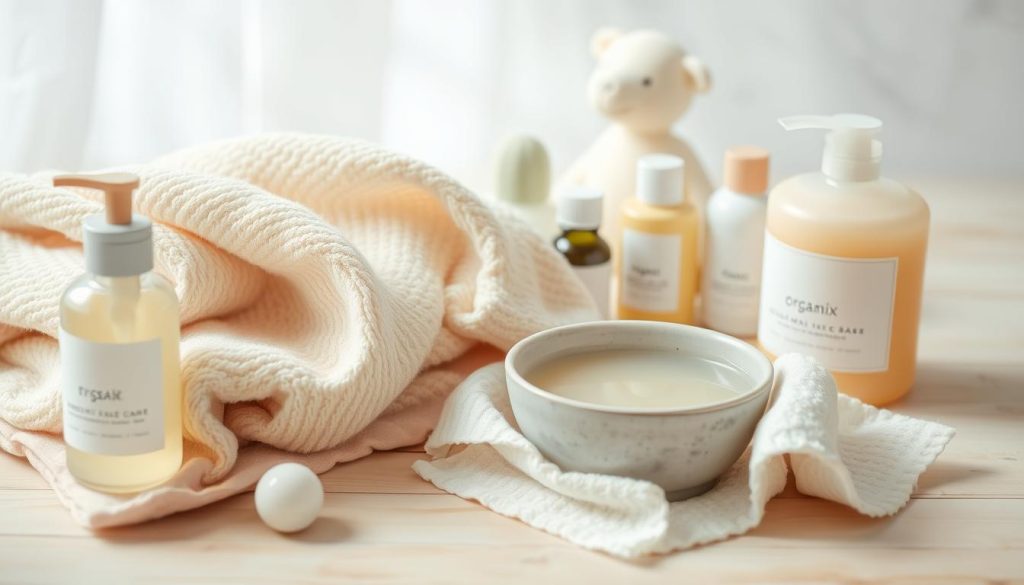
By adopting these nurturing practices, you can help your baby feel more comfortable. You can also ensure their skin is as healthy as possible. Remember, if symptoms persist or you have concerns about your baby’s skin health, always consult a pediatrician.
Patient Stories and Testimonials: Healing Baby Acne
Many parents face the surprise of baby acne in their newborn’s early months. Finding the right newborn acne treatment and baby acne remedies is key. Success stories from other parents show us that baby skin can heal with the right care.
A parent from Florida used a gentle cleanser and a daily wash routine. This helped a lot in improving her baby’s skin. Another parent from Texas found natural remedies like breast milk worked well. They kept their baby’s skin clean and dry, avoiding harsh chemicals.
These stories teach us the importance of being patient and gentle. Parents learn that simple changes can make a big difference. With the right knowledge and support, they can tackle baby acne with confidence.
FAQ
What triggers baby acne in newborns?
Hormonal changes in pregnancy can cause baby acne. This can pass to the newborn. Other reasons include yeast, skin irritation, and some medicines.
What does baby acne look like and where does it usually appear?
Baby acne looks like small red bumps or pustules. It’s like teenage acne. It shows up on the cheeks, forehead, chin, and sometimes the back.
When should I consult a pediatrician about my baby’s acne?
See a pediatrician if the acne lasts long, gets worse, or spreads. Also, if it’s making your baby uncomfortable or if there’s a fever or swelling.
Are there any simple steps I can take at home to treat baby acne?
Yes, many cases of baby acne go away on their own. Keep your baby’s skin clean and dry. Use water and mild baby soap once a day. Avoid using adult skincare products.
What should I avoid doing when caring for a baby with acne?
Don’t over-wash or scrub the skin. Avoid oily or scented lotions. They can make the acne worse. Also, don’t pick or squeeze the pimples to avoid scarring or infection.
Can natural remedies be effective in treating baby acne?
There’s little scientific proof for natural remedies. But, some parents find breast milk helps. Always check with a pediatrician before trying any remedy.
How can I gently cleanse my baby’s skin?
Use mild, fragrance-free cleansers for infants. Clean with lukewarm water and pat dry with a soft towel. Avoid rubbing hard, as it can irritate the skin.
Could my diet be affecting my nursing baby’s skin?
It’s possible. Some foods might affect your baby’s skin. Talk to your pediatrician or a dietitian if you think this might be the case.
What lifestyle changes can improve my baby’s skin health?
Keep your baby’s environment clean and smoke-free. Use hypoallergenic detergents and soft, breathable fabrics for clothes and bedding.
How can I prevent baby acne before it starts?
Keep your baby’s face clean and avoid heavy creams or oils. Make sure all items touching your baby’s skin are clean. Regularly clean items like feeding materials and pacifiers to remove germs.
Are there home comfort measures that can help soothe baby acne?
Yes. Keep your baby comfortable with mild temperatures and gentle clothes. Make sure they stay hydrated and use a cool compress if needed.
What should I take away from other parents’ experiences with baby acne?
Many parents say baby acne usually goes away on its own. They advise patience and gentle skin care. Knowing others have gone through it can be reassuring.












